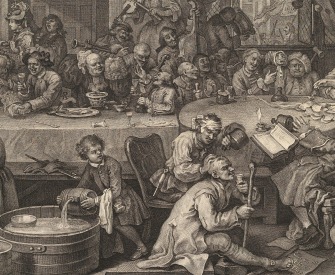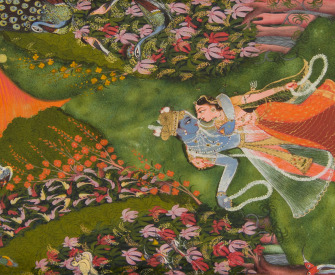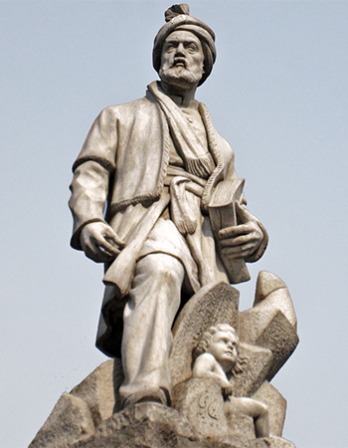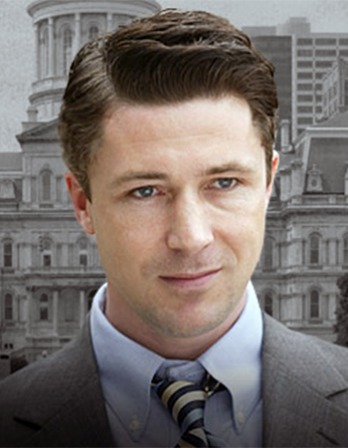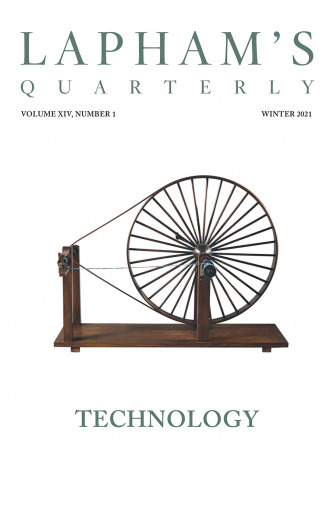The state dictates and coerces; religion teaches and persuades. The state enacts laws; religion gives commandments. The state is armed with physical force and makes use of it if need be; the force of religion is love and benevolence.
—Moses Mendelssohn, 1783Among the Mormons
Jon Krakauer on going back to basics in Utah.
After Dan Lafferty read The Peace Maker and resolved to start living the principle of plural marriage, he announced to his wife Matilda that he intended to wed her oldest daughter—his stepdaughter. At the last minute, however, he abandoned that plan and instead married a Romanian immigrant named Ann Randak, who took care of some of Robert Redford’s horses on a ranch up Spanish Fork Canyon in the mountains east of the Dream Mine. Ann and Dan had met when he’d borrowed a horse from her to ride in a local parade. She wasn’t LDS [Church of Later Day Saints], says Dan, “but she was open to new experiences. Becoming my plural wife was her idea.” Ann, he adds, “was a lovely girl. I called her my gypsy bride.”
Living according to the strictures laid down in The Peace Maker felt good to Dan—it felt right, as though this really was the way God intended men and women to live. Inspired, Dan sought out other texts about Mormonism as it was practiced in the early years of the church.
It didn’t take him long to discover that polygamy wasn’t the only divine principle the modern LDS Church had abandoned in its eagerness to be accepted by American society. Dan learned that in the nineteenth century, both Joseph Smith and Brigham Young had preached about the righteousness of a sacred doctrine known as “blood atonement”—certain grievous acts committed against Mormons, as Brigham explained it, could be rectified only if the “sinners have their blood spilt upon the ground.” And Dan learned that Joseph had taught that the laws of God take precedence over the laws of men.
Legal theory was a subject of particular interest to Dan. His curiosity had first been aroused when he was training to be a chiropractor in California, following a run-in he had with state and county authorities. At the time, he supported his family primarily by running a small sandwich business out of their home. Dan, Matilda, and the oldest kids would get out of bed before dawn every morning in order to make and wrap stacks of “all-natural” vegetarian sandwiches, which Dan would then sell to other chiropractic students during the lunch hour.
“It was a very profitable little hustle,” Dan says proudly. “Or it was until the Board of Health closed me down for not following regulations. They claimed I needed a license and that I wasn’t paying the required taxes.” Just before he was put out of business, Matilda had given birth to a baby boy. Money was tight. Losing their main source of income was problematic. It also proved to be a pivotal event in Dan’s passage to fundamentalism.
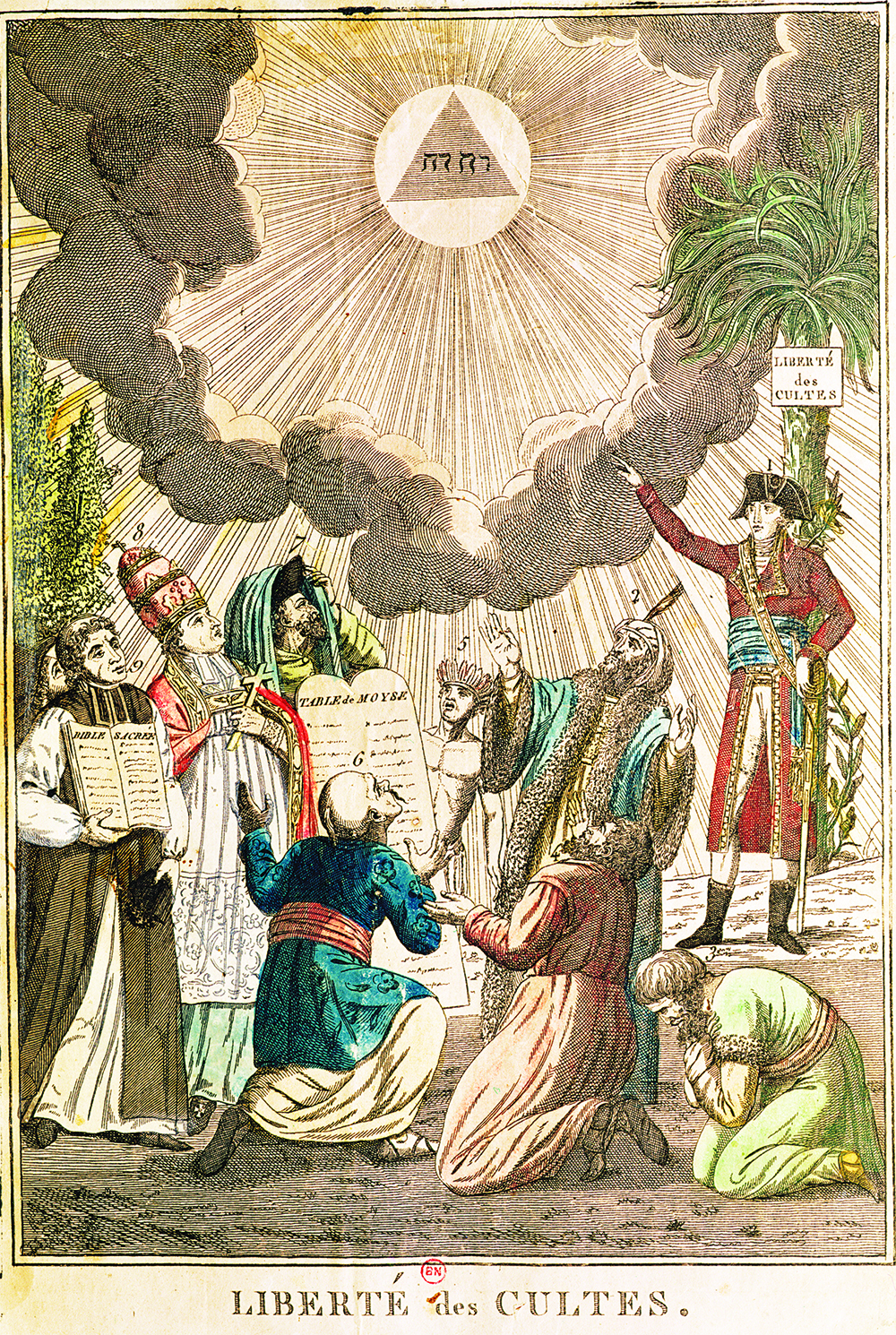
Decree establishing freedom of worship, French engraving, 1799. © Bibliothèque Nationale, Paris, France / Lauros / Giraudon / The Bridgeman Art Library International.
“After they shut me down,” Dan recalls, “I didn’t know quite what to do … It didn’t seem right to me that the government would penalize me just for being ambitious and trying to support my family—that they would actually force me to go on welfare instead of simply letting me run my little business. It seemed so stupid—the worst kind of government intrusion. In the Book of Mormon, Moroni talks about how all of us have an obligation to make sure we have a good and just government, and when I read that, it really got me going. It made me realize that I needed to start getting involved in political issues. And I saw that when it comes right down to it, you can’t really separate political issues from religious issues. They’re all tied up together.”
Upon completing his chiropractic training and returning to Utah, Dan went to work as a chiropractor for his father. The Lafferty parents had sold their farm and bought a house in the old part of downtown Provo; Dan’s father ran his practice out of a basement office in this home. In 1981, shortly after Dan started working for Watson Sr., the LDS Church sent both of the elder Laffertys abroad on a two-year mission, at which point Dan and his younger brother Mark (who had graduated from the Los Angeles College of Chiropractic six months after Dan), agreed to take over the practice in their father’s absence.
When Dan and Mark started working together in their father’s office, the special closeness they had shared in their youth was rekindled. During breaks between patients they engaged in heartfelt discussions about everything that was most important to them—and increasingly what seemed most important concerned religious doctrine and its power to remedy the insidious evils inflicted by the government on its citizens.
Regarding the timing of these heart-to-heart talks, Dan reports, “I began to observe a fascinating phenomenon.” Dan and Mark were usually so busy seeing patients that often several days would pass between their religious-political discourses. But on those days when they would unexpectedly have gaps in the schedule in which to talk at length, says Dan, “rather mysteriously, my younger brothers would show up, unannounced. And we would have some very, very valuable time discussing issues.”
Dan usually led the discussions, which inevitably described how the government had far exceeded its constitutionally mandated reach and was dangerously out of control. Buttressing his arguments by quoting scripture from the Book of Mormon, he patiently explained to his brothers that the government had no right to require American citizens to obtain any kind of license, or pay taxes, or submit to the oppressive burden of a Social Security number. “I had come to realize,” Dan says, “that a license was simply an agreement with the government to let them have control of your life. And I decided I didn’t want them to have control of my life … I already had a basic right to enjoy all of the basic activities of a human being, without their permission.”
Although Dan had not yet allied himself with any established fundamentalist church or prophet, his self-directed studies had transformed him into a de facto Mormon fundamentalist—and an exceedingly ardent one. The impetus for most fundamentalist movements—whether Mormon, Catholic, evangelical Christian, Muslim, or Jewish—is a yearning to return to the mythical order and perfection of the original church. Dan Lafferty was moved by this same desire.
The more he studied historical Mormon documents, the more certain Dan became that the LDS Church had blundered off course around 1890, when then-president and prophet Wilford Woodruff was coerced into doing away with the doctrine of plural marriage by the godless government in Washington, DC. The modern LDS Church, Dan had become convinced, was an elaborate fraud.
Like fundamentalists in other faiths, he was intent on adhering unfailingly to God’s “true” commandments, as determined by a rigorously literal interpretation of his church’s earliest and most sacred texts. And he was no less intent on adhering to the “true” commandments of his country’s earliest and most sacred texts, as well. To Dan, such documents as the Book of Mormon, The Peace Maker, the United States Constitution, and the Declaration of Independence are all of a piece—they are holy scriptures that provide a direct link to the Almighty. The authority that flows from their divinely inspired sentences is absolute and immutable. And it is the duty of righteous men and women to conduct their lives according to a stringently literal reading of those sentences.
For people like Dan who view existence through the narrow lens of literalism, the language in certain select documents is assumed to possess extraordinary power. Such language is to be taken assiduously at face value, according to a single incontrovertible interpretation that makes no allowance for nuance, ambiguity, or situational contingencies.
After seeking guidance through prayer and receiving confirmation that he was acting in accordance with the Lord’s wishes, Dan sent his driver’s license back to the state of Utah, revoked his marriage license, and returned his Social Security card. He ignored posted speed limits, which he believed were illegal, and simply drove “wisely and carefully” instead. And he quit paying taxes of any kind—including the sales tax when he shopped in local stores, which provoked frequent confrontations with cashiers.
Energized by the self-evident righteousness of his crusade, in the summer of 1982 Dan declared himself a candidate for sheriff of Utah County and embarked on a lively political campaign, speaking at public forums, writing letters to the Provo newspaper, doing radio interviews, and riding in small-town parades. He promised, if elected, to enforce the laws according to a scrupulously literal interpretation of the U.S. Constitution. As he explained, “My motive in running was to restore the primacy of common-law juries and to restore the fundamentals of the Constitution.”
God is a complex of ideas formed by the tribe, the nation, and humanity, which awake and organize social feelings and aim to link the individual to society and to bridle the zoological individualism.
—Maxim Gorky, 1913On October 4, Dan was driving home after meeting with another candidate for sheriff (the American Fork police chief, with whom Dan had hoped to engage in a public debate), when he was stopped on Interstate 15 by a Utah state trooper for speeding and not having a vehicle-inspection sticker. “I had already had some confrontations with the officer who pulled me over,” Dan allows. “He knew I would be driving home from this debate meeting, and he had set a trap for me. They wanted to get a felony against me so I couldn’t run for office, and they swarmed me on the freeway. I had just published an important article in the paper—a very important article—which had really unnerved a lot of people, about how the powers of government were being improperly used through improper warrants of arrest—how it was unconstitutional to stop a person on the freeway and arrest them.
“When the officer pulled me over, he told me he had read my article—‘I’ve got it right here in my car,’ he said. So I told him, ‘Well, if you’ve read the article, you understand why you can’t arrest me right now. If you want to arrest me, go get a warrant from a judge, bring it to my home, and I’ll conform to the proper procedures.’” Dan had by now locked the car doors and rolled up all the windows, leaving only a one-inch gap at the top of the driver’s window, which, he says, “I figured was narrow enough to keep a hand from reaching in and grabbing me, but would allow me to talk to the officer.”
The trooper wasn’t amused. He ordered Dan out of the car. “When I refused to get out,” says Dan, “the cop did something I hadn’t anticipated—he grabbed the top of the window with both hands and pulled hard, pulling the window out of its tracks, and then he tried to reach in and grab me. So I said, ‘Well, I gotta go now! See you later!’ and took off.”
The state troopers gave chase and apprehended Dan a short while later. He was charged with five crimes (including second-degree felony escape, third-degree felony assault by a prisoner, and evading an officer) and locked up in the county jail. At his justice court trial, Dan served as his own attorney and attempted to mount a defense based on several arcane points of constitutional law. The judge repeatedly pointed out, however, that justice courts in Utah are not empowered to hear constitutional matters, which infuriated Dan. He was further angered when the judge overruled his objection to the makeup of the four-woman jury (Dan argued that he was entitled to have at least one male on the jury).
When Dan ignored the judge’s instructions and continued to argue his case on constitutional grounds, the exasperated judge declared him in contempt of court—at which point Dan’s brothers and several other supporters staged a riot in the courtroom, shouting that they were placing the judge, prosecutor, and court clerk under “citizen’s arrest.” In the middle of this melee, Dan stood up and loudly admonished the judge, “In the name of Christ, do justice or be struck down!”

Jon Krakauer
From Under the Banner of Heaven. After his trial, Dan Lafferty was sent to prison for psychiatric evaluation and then jailed. He and his brother Ron were later convicted for the murder of their brother’s wife and fifteen-month-old daughter, an act they claimed God had commanded them to do. The author of Into the Wild and Into Thin Air, Krakauer published Where Men Win Glory in 2009.
